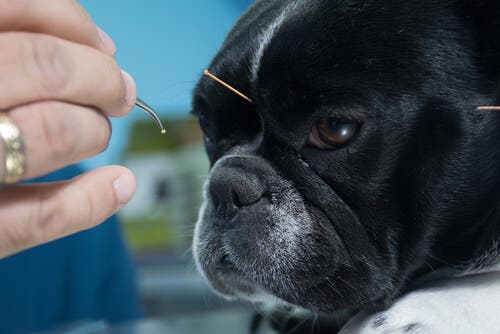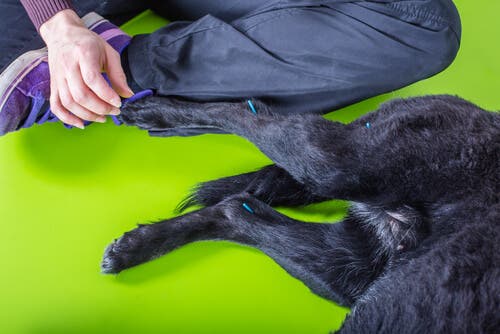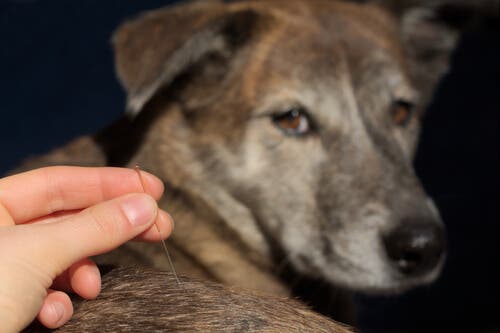Veterinary Acupuncture: All You Need to Know

Veterinary acupuncture has been gaining more and more fans in the Western world thanks to its benefits. In addition, this traditional Chinese medicinal therapy has preventive, curative, and palliative applications for physical and psychological pathologies.
Therapeutic veterinary acupuncture: Characteristics and beneficial effects
Acupuncture is currently the most widespread specialty of traditional Chinese medicine. Among its contributions, we have the case of phytotherapy, massages, and diet therapies. Nevertheless, the first accounts of medicinal applications in humans date back more than 5,000 years.
Its application requires specific skills and knowledge to generate certain physiological effects that will be beneficial for the body. Therefore, acupuncture is considered a specialty and requires specific and professional training to carry it out.
Among the various desired effects of acupuncture for the improvement of the body’s well-being we have the following:
- Endorphin release
- Chronic pain relief
- Immune system stimulation
- Blood pressure regulation
- Balance of hormone production and the metabolism
- A feeling of general well-being
- A delay of the bones and joints’ degenerative process
- Helps fight vices and chemical dependencies
How veterinary acupuncture works
In the last few decades, the application of acupuncture in domestic and wild animals has been gaining popularity. Especially in Europe and North America. Since then, this discipline has been included in the veterinary medicine career and specialized professionals are been trained.
Veterinary acupuncture follows the same principles as acupuncture performed in humans. It basically involves stimulating certain points of the body for which they use tiny needles that are about two millimeters in diameter.

Specialists have located more than 100 strategic points for needle stimulation. As a result, this allows us to connect the nerve fibers and nerve sets of the body, which provide topical or general physiological responses.
The application of the needles is safe and painless. However, it can generate slight tingling and heat sensations. Mood and comfort are essential for positive acupuncture outcomes. Therefore, the animal should be prepared and comfortable before attempting to perform the therapeutic sessions.
In addition, it is essential to have your veterinarian’s approval before opting for any treatment for your pet. The doctor’s diagnosis and specialized opinion will be essential to properly guide the practice of veterinary acupuncture.
What veterinary acupuncture is recommended for
Veterinary acupuncture is often recommended to relieve acute and chronic pain symptoms caused by physical and psychological disturbances. It does so in such a way that it’s more common to apply it as a curative and/or palliative alternative therapy.
We should note that it isn’t necessary for the patient to be ill to resort to the benefits of this technique. Therefore, stimulating the nervous, immune, respiratory and hormonal systems is excellent for preventing many pathologies and improving the animal’s quality of life.
What does it treat?
Currently, acupuncture is widely used to treat animals suffering from the following pathologies:
- Neurological pathologies: Epilepsy, degenerative myelopathies, paralysis.
- Muscular and/or skeletal pathologies: Herniated discs, dysplasia, arthritis, osteoarthritis, and limping.
- Hormonal or endocrine system: Diabetes, hypothyroidism, Cushing’s disease, etc.
- Overweight, obesity, and associated diseases such as feeding disorders, hypertension, etc.
- Heart failure and arrhythmias.
- Respiratory pathologies: Asthma, rhinitis, sinusitis, and pneumonia.
- Gastrointestinal pathologies: Constipation, inflammation, vomiting, and diarrhea.
- Renal and urinary: Kidney failure and kidney stones, urinary incontinence, urological syndrome, etc.
- Autoimmune diseases, immunodeficiency, and associated diseases.
- Allergies, itching, and dermatological inflammations.
- Behavioral disorders: Anxiety, depression, phobias, aggressiveness, etc.
- After surgery rehabilitation, trauma, and accidents.

The benefits of veterinary acupuncture for terminally ill animals are also notable. Its effects allow it to significantly reduce pain and improve the patient’s quality of life during the degenerative process.
Is veterinary acupuncture very effective?
Its actual effects are still being studied and findings are still happening. However, it’s important to be aware of the scope and objectives of veterinary acupuncture as a whole.
It wouldn’t be responsible to talk about acupuncture or any alternative therapy as a promise for a cure. Its greatest value is in preventing and improving the harmful or painful consequences of chronic, degenerative, and terminal diseases.
Like any stimulation procedure, its results are usually not immediate compared to an analgesic or other drugs. Therefore, curative acupuncture is often combined with other allopathic, homeopathic, or phytotherapeutic treatments.
In sum
Acupuncture is often very effective for conduct and behavioral disorders. Nevertheless, it’s essential to understand that neither therapy nor any drugs can replace a dog’s proper education and early socialization.
It’s important that we start thinking about veterinary acupuncture as a complement to pet preventive medicine. In addition, we know enough facts to consider it not just as an alternative therapy for chronic pain.
